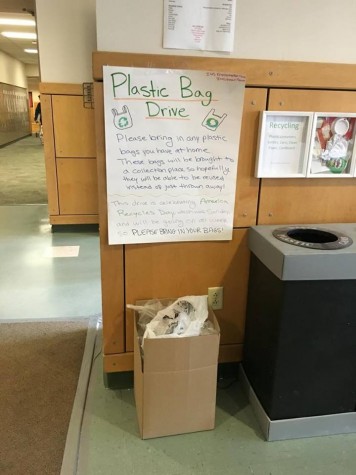Ban the Bag
May 9, 2016
 Climate change and environmental health are two of the largest threats that will be faced by this generation. Of all the smaller issues these broad terms encompass, environmental cleanliness is a big one. Every year, millions of plastic bags blow into forests, neighborhoods, and beaches, wreaking havoc on animals and ecosystems. While cities and states across America have made moves to try to curb this problem, Ipswich High School students think they have what it takes to do their part and make an impact in their local community: introducing a bill to ban single use plastic bags to be voted on at Town Meeting.
Climate change and environmental health are two of the largest threats that will be faced by this generation. Of all the smaller issues these broad terms encompass, environmental cleanliness is a big one. Every year, millions of plastic bags blow into forests, neighborhoods, and beaches, wreaking havoc on animals and ecosystems. While cities and states across America have made moves to try to curb this problem, Ipswich High School students think they have what it takes to do their part and make an impact in their local community: introducing a bill to ban single use plastic bags to be voted on at Town Meeting.
The project started with a green idea presentation to win a trip to a leadership summit in Costa Rica. Jillian Wall, the senior spearheading the movement, says she came up with the idea while she was at work. “I noticed they didn’t use plastic bags.” This was for a good reason. After researching the short and long term effects of plastic bag waste that other businesses have on the environment, she concluded that the ban would be a great choice for her proposal. After being selected to attend the summit, she enrolled in Lori LaFrance’s Sustainability class to further pursue getting the proposal written into law.
Most scientists and environmentalists point to the manufacturing process when asked about the problems with disposable plastic bags. The plastic used to make the bags are mainly made out of petroleum, the same chemicals that are refined into things like oil and gas. The process of making these bags is really inefficient; in fact, a car could drive 36 feet on the amount of oil used to make just one bag. When taking into account that billions of these bags are produced around the world every year, the cost really adds up.
Another reason many citizens are staunchly against the use of these bags is due to what happens to them after they’re used. Because the bags are made out of plastic, they don’t decompose, and are very inconvenient and expensive to recycle. Bags that aren’t properly disposed of end up blowing around our local environments, getting caught in trees, and being eaten by land and sea wildlife, causing health problems and often death.
As far as the effects of banning plastic bags would go, Wall explained, “I think that it would benefit Ipswich very well. There wouldn’t be plastic bags on the streets or in the trees and we can even make Crane’s Beach a lot cleaner.” She added, “We would also not be contributing to pollution in the ocean, which would save animals’ lives.”
While the bill bans disposable plastic bags, it offers suggestions to stores and businesses to switch to paper bags, and to consumers to carry reusable bags. Wall insists that while it may seem inconvenient now, in the long run, “We would be saving businesses money from having to dispose of the plastic bags.”
Wall is confident that the ban will pass, saying, “I think that [support] is in our favor.” Ipswich is in an unique position to make a large impact, as a seaside town. With vocal supporters and dissenters, it will be a fight right to the end. Ipswich Town Meeting is on May 10th, so we will see.
